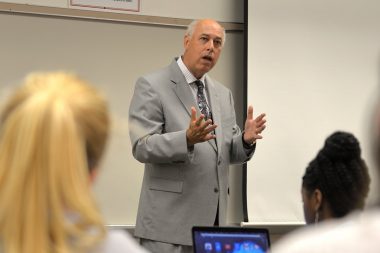The School of Communications dean visited 10 COM 100 classes to begin the fall 2015 semester, providing insight into the school’s curriculum, expansion plans and student media organizations.

One student in Associate Professor Naeemah Clark’s “Communications in a Global Age” course took advantage of Parsons’ Sept. 1 classroom visit to ask such a question. The dean obliged and headed to the whiteboard with a dry erase marker to scribble out the peculiars of each degree.
Parsons’ brief curriculum recap was part of an informal 25-minute classroom appearance to highlight the opportunities in the School of Communications and the university as a whole. It was one of 10 such visits scheduled this semester to allow the dean to speak with students enrolled in the Communications Department’s opening course.
“I enjoy visiting with students in ‘Communications in a Global Age’ because I know many of you are interested in majoring in the School of Communications and others of you are taking the course to explore it … whatever your reason, here’s a brief introduction to the school,” said Parsons at the onset of his talk.
Among the topics Parsons discussed were the department’s five majors, the campus’ student media organizations, and the ongoing communications expansion project, including the construction of Dwight C. Schar Hall. A few lighthearted moments included the dean inquiring about students’ sticker décor on their laptops as well as his acknowledgement that his high school newspaper, which he edited, wasn’t quite as good as he remembered the last time he browsed his personal archives.
“We tried to create a curriculum that has a nice balance of conceptual courses, understanding the world that you’re in; writing courses, writing is still important to all of us; and production courses, because you’re going to be in a world where you are producing content in different forms,” said Parsons, elaborating on the school’s curriculum. “We’re preparing you for lifelong learning as well as careers in communications.”


